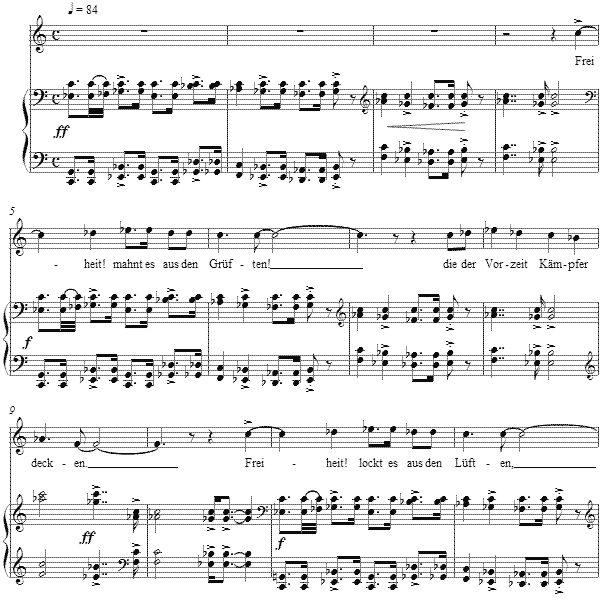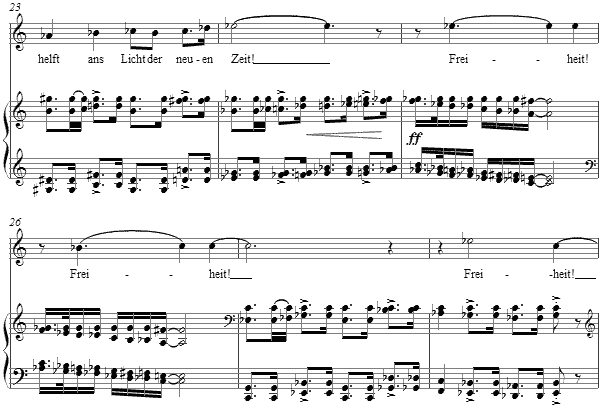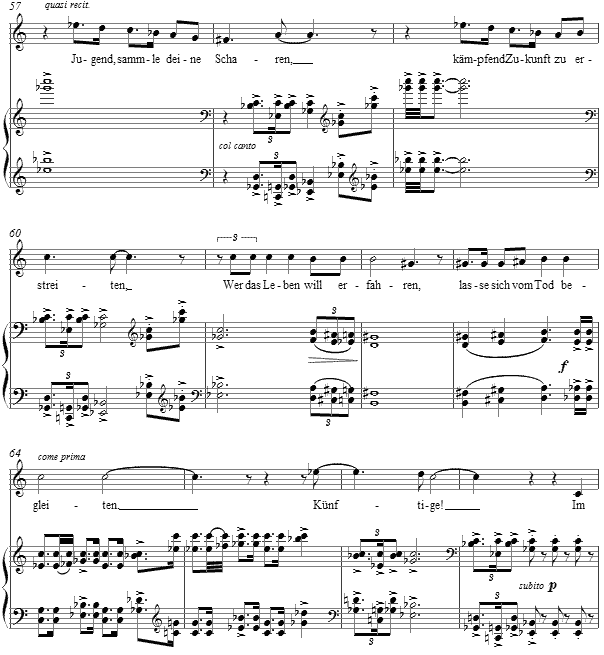Music and Texts of GARY BACHLUND
Vocal Music | Piano | Organ | Chamber Music | Orchestral | Articles and Commentary | Poems and Stories | Miscellany | FAQs
Gesang der jungen Anarchisten - (2009)
Erich Kurt Mühsam
for medium voice and piano
Freiheit! mahnt es aus den Grüften,
die der Vorzeit Kämpfer decken.
Freiheit! lockt es aus den Lüften,
die der Zukunft Stürme wecken.
Daß aus Ahnung Freiheit werde,
haltet, Künftige, euch bereit.
Reinigt die entweihte Erde -
helft ans Licht der neuen Zeit!
Freie Menschen sollen wohnen,
wo gequälte Sklaven schleichen,
Menschen, die aus allen Zonen
Gruß und Trunk einander reichen.
Von Gesetzen nicht gebunden,
ohne Herrn und ohne Staat -
frei nur kann die Welt gesunden,
Künftige, durch eure Tat!
Jugend, sammle deine Scharen,
kämpfend Zukunft zu erstreiten.
Wer das Leben will erfahren,
lasse sich vom Tod begleiten.
Künftige! Im heiligen Ahnen
lechzt die Welt nach Glück und Licht.
Mahnend wehn die schwarzen Fahnen:
Freiheit ist der Jugend Pflicht![ 6 pages, circa 4' 00" ]
Erich Mühsam
Erich Kurt Mühsam (1878-1934) was born in Berlin, child of Jewish parents, and raised in Lübeck. He had two sisters and a borther. The father, Siegfried Seligman Mühsam, was a pharmacist and then from 1887 bis 1915 a deputy in the Lübeck government. In 1896 Erich Mühsam developed sympathies to the Social Democrats in the time of the Kaiser, writing for the Lübecker Volksbote. He turned to a course in pharmacology in Lübeck, but soon moved to Berlin (1901). There while working as pharmacist he also worked as editor for an anarchist journal, Der arme Teufel.
What followed was a period of travel to the south of Europe, and then settling into Munich, where he founded anarchist organization. He was arrested, and charged with political agitation. His life followed more writing and more political agitation, with occasional internment in jails only to be followed by more creativity and political work, especially for the release of political prisoners. From WWI to WWII this was his pattern, until finally, as his biography tells, he was murdered in 1934 by the National Socialists' SS in the Oranienburg concentration camp, after having been arrested on the night of the arson of the Reichstag - done by these very same National Socialists. Mühsam's theme as judged by this fine text was less to support a specific political plan as to stress freedom, freedom and freedom - that is to say, freedom from tyrannical government [ 1 ].
Freedom! It is urged from out of the graves,
That mark the fighters of yesterday.
Freedom! It is enticed from the winds,
That future storms will awaken.
That freedom will be predestined
Upheld, tomorrow's children, ready for you.
Purify the desecrated earth -
Help to bring to light the new age!
Free men shall live,
Where the forced slaves creep,
Men from all walks of life
who greet and toast each other richly.
Unburdened by rules,
Without lords and without state -
freedom only can heal the world.
Tomorrow's children, through your act!
Youth, gather into crowds.
Fighting to win your future.
Who would fully live life,
Let him live with death.
Future ones! Through holy forebears
Thirsted the world after happiness and light.
Think to the black halyards:
Freedom is youth's duty!
The setting came to mind while reading the text alongside thoughts of the so-called Partizaner Lid, Zog Nit Keynmol (Yiddish: זאָג ניט קיין מאָל), which I had sung many times earlier in my life. As that song of defiance is a solid 4/4 march, I thought this setting also should be of that character. The darkness of Mühsam's life story also was in my thoughts, so the dotted rhythms were mixed with the smaller intervals, harmonic relationships of minor thirds for the chord progressions as found in the first measures. This was spun out an opening gesture which drives the setting forward, as the voice sings out a defiant "Freiheit!" It stands defiant against those who would quash freedom -- a government growing unlimited in its applications of power.
The opening gesture becomes transposed into a related tonal region as the bridge material breaks the first two stanzas of the poem into a two-part form, for the purposes of emphasizing the word, "freedom," several times. This becomes the end of the first stanza, and the setting returns to sing out a second stanza like the first.
The third stanza of the poem is a "charge" to the young to take up the cause of freedom. For this the setting turns away from the march-like rhythms for a section, marked "quasi recit." It is suggested that the performers find some musical freedom in this making the charge for Mühsam as we contemplate these words again in our -- or some future -- time.
The score for Gesang der jungen Anarchisten is available as a free PDF download, though any major commercial performance or recording of the work is prohibited without prior arrangement with the composer. Click on the graphic below for this piano-vocal score.
NOTES
[ 1 ] The word, freedom, is often defined loosely. Dictionaries give many alternatives, couched in terms of freedom "from" -- the preposition being all important -- bondage, slavery, serfdom and the like, as well as freedom "from" being constrained by government, freedom from burdensome taxation, or that sort of freedom which allows the individual choice between things. Taken together and mixed with other dictionary definitions of freedom, this comes to a phrase which is quite clear, "freedom from government." Of course, total anarchy is the lack of government, and the practical individual recognizes various forms of limited government as necessary to the commonweal. Yet, this is the entry point on a well-proven and historically documented slope from smaller to larger and final to pervasive and all powerful government. This seems more the rule, than the exception.
For this poets have consistently sided with freedom "from" government. Some examples are worth noting herein: One of America's quintessential home grown poets, Walt Whitman, wrote plainly, "Once unquestioning obedience, / once fully enslaved, / no nation, state, city of this earth, / ever afterward resumes its liberty. / Resist! Resist!"
An equally American Ambrose Bierce set aside his sardonic humor for this earnest observation on "Freedom," "She screams whenever monarchs meet, / And parliaments as well, / To bind the chains about her feet / And toll her knell."
Composer and iconoclast Charles E. Ives wrote, observing how easily freedom can be diluted: "Prejudice and politics, and the stand-patters came in strong, and yelled, 'slide back! Now you’re safe, that’s the easy way!'"
Carl Sandburg, poet and scholar on the life of Abraham Lincoln, observed about government, politicians and their ultimately thin skins: "A Government is just as secret and mysterious and sensitive / as any human sinner carrying a load of germs, / traditions and corpuscles handed down from / fathers and mothers away back."
Robert Service was even more plainly spoken, avowing: "To hell with Government I say; / I'm sick of all the piddling pack."
While Erich Mühsam's biography shows him involved with the early Social Democrats during life under the Kaiser, and then under the inept and quickly failed Weimar Republic, only to be followed by the Nazi Party and their National Socialism, I wager from this poet's other work that allegiance to a political party was a temporary thing, useful in a time to oppose a government, for he in fact titled this poem specifically, "Song of the young Anarchists." This lesson is well worth remembering, and I do so herein by setting these fine words and cry for freedom to song.



